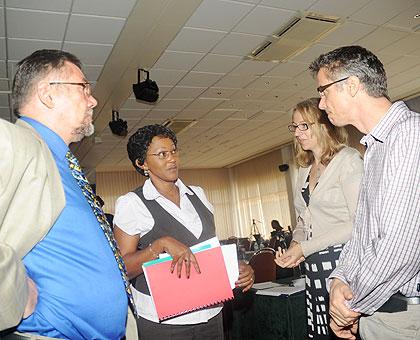The draft annual report on capacity building activities of the 2010-2011 financial year in the public sector, released yesterday, indicates that civil servants have gained skills despite existing constraints.


The draft annual report on capacity building activities of the 2010-2011 financial year in the public sector, released yesterday, indicates that civil servants have gained skills despite existing constraints. The report covered five sectors that included Health, Agriculture, Education, Decentralisation and Infrastructure. Oxford Policy Management (OPM) from the United Kingdom was commissioned to draft the report.According to statistics, US$ 2,140,905 was spent in the agricultural sector on capacity building as part of the Strategic Plan for Agricultural Transformation (PSTA) with 70 percent focusing on organisational strengthening, and another 18 percent on long-term overseas academic training programmes.Most of the capacity building activities in the agricultural sector also focused on supporting farmers and cooperatives.In the health sector, steps were taken to address issues related to the performance of health workers, equitable distribution of staff, human resources management, and the institutional restructuring of the Rwanda Biomedical Centre as the primary implementation agency.According to the report, US$ 32.5m was spent on capacity building activities in the health sector.In an interview with The New Times, the Executive Secretary of the Public Sector Capacity Building (PSCBS), Stella Ford Mugabo, mentioned that in spite of enhancement of capacity building programmes, the issue of brain drain was still a hindrance."We are on the right track of increasing capacity building in our country, but the challenge we still face is that of local experts who are moving to the regional and international level,” she lamented.She observed that after university, many graduates leave the country in search of greener pastures, leaving behind the problem of inadequate skilled human resources The Ministry of Education developed an Education Sector Strategic Plan (ESSP) 2010-2015 that highlights teachers’ recruitment, students assessment and curriculum development.There has been heavy focus on the provision of vocational training at the teacher and school level by 78 percent, including enhancement of the English language.In capacity building activities, 38 percent were short term vocational training, 39 percent focused on long term vocational training ,14 percent on developing human resource management, one percent on academic training, while eight percent was unspecified.The report further indicates that the infrastructural sector was divided into three areas; energy, transport, water and sanitation, with activities ranging from job training with 63 percent, capacity building for enterprises took 23 percent, developing organisational strategies 11 percent, while two percent went to purchase equipment. One percent was on developing monitoring and evaluation systems.Mugabo further noted that the infrastructural sector is the most heavily-affected sector noting that that more investments were needed to improve the performance of the ministry."Infrastructural sector is where we face challenges. We don’t have enough local experts, and when we hire international experts, we normally lack local experts to accompany them. That’s why we still need to invest more in the sector,” she explained.On decentralisation, the report indicates that more emphasis was put on short term vocational training which took the lion’s share of 60 percent while the rest went to developing internal policy and planning, and purchasing equipment, among others.Thw Principal Consultant at OPM, Andrew Wyatt, disclosed that unless the country focuses on provision of incentives to workers, the problem of brain drain will have a negative impact on the country’s development."More incentives and motivation is needed in the public sector. However, unless the government embarks on that, more local experts will continue to leave the country and in the long run, it will affect the country’s development,” he stated in an interview Other challenges identified were training of individuals instead of focusing on the organisational level.


